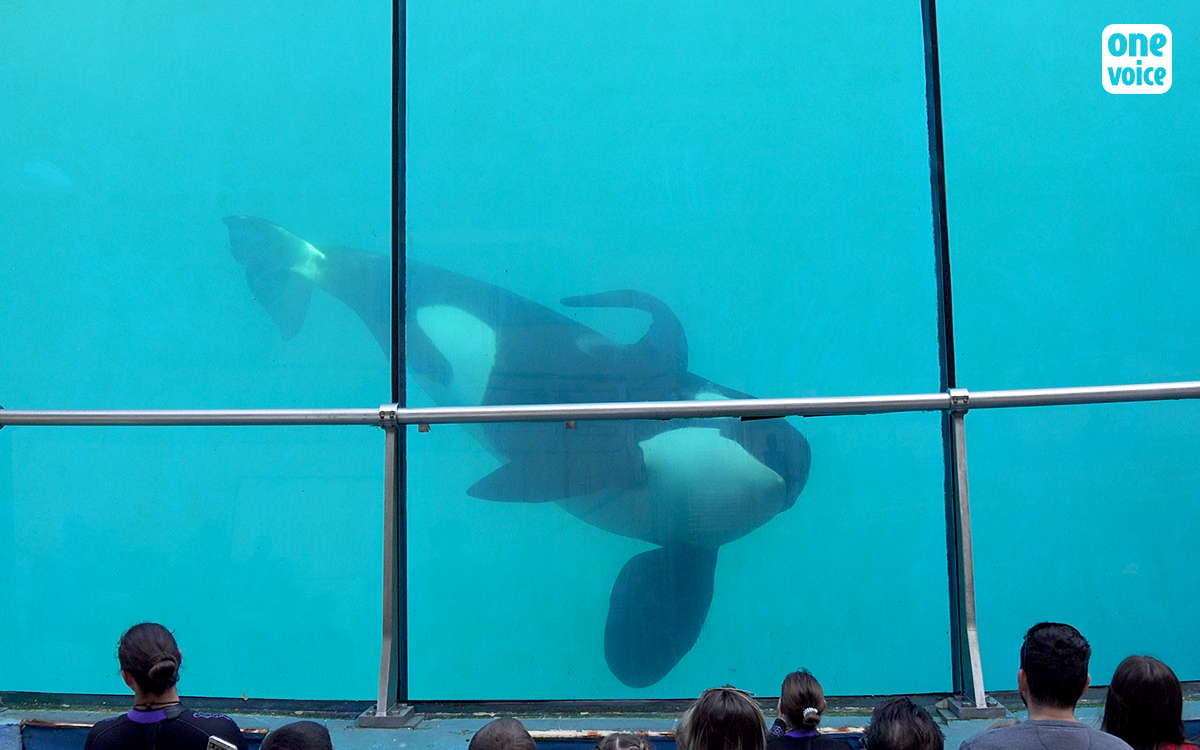

Let’s give a life to Inouk
Following the observation of Inouk, we commissioned a report by the biologist and specialist, Ingrid Visser. This report, co-written by three scientists, is clear: Inouk is in great suffering and gnaws at the walls of the pool where he is detained. One Voice launches a campaign for Inouk, and lodges a complaint against Marineland of Antibes for acts of cruelty. We ask that Inouk be transferred in a marine sanctuary.
Stereotypical: First visible signs of ill-being
Inouk was born in captivity on 23rdFebruary 1999 to parents who were caught as babies in Iceland’s far north. Orphaned since childhood, it’s been twenty years now that he turns in circles and floats, inert, in the pool. These repetitive movements are, like a hundred paces for felines or swaying for elephants, another expression of the same evil: the madness due to the stress of confinement, typical of captive animals in a grave situation… stereotypical pathological movements.
This big young male is recognizable by his dorsal fin which has totally collapsed over to the right side. Ingrid Visser notes that to see this in orcas who are in the wild is rare, and “associated with poor health and trauma”. In captivity, however …
Self-injury: captivity in question
There is nothing in the pools of Antibes. Neither to do nor to see. No escape. Nothing but extreme boredom. For him who is a member of such an intelligent species with self-awareness, a very complex language, elaborate social links … this tiny pool, compared to the ocean, is his prison!
Between his constant turning around inside tiny pool, Inouk is in such a state of suffering and frustration that he is eating away at the concrete walls. Many publications document this phenomenon. In captivity, the majority of orcas eat away at the walls of these pools. But Ingrid Visser, who observed it in situ, is categorical: along with her colleagues they have never seen an orca’s jaw in such bad shape. Inouk has ended up using all his teeth, gnawing them down to the pulp. Oral pain is the same for orcas as it is for humans. He has developed gum ulcers and regurgitation problems. Stomach acid only makes the situation worse.
«In summary, Inouk suffered, and likely continues to suffer, from tooth loss, tooth fracturing and from teeth with exposed pulp. Inouk likely suffers from acute and chronic stressors associated with unnatural confinement. In effect, he has a reduced quality of life due to captivity.»Ingrid Visser, John Jett, Jeffrey Ventre
$(document).ready(function(){ $(‘.diaporama’).bxSlider(); });
Inouk is in constant pain, during every moment of every day and every night
Blind to its own responsibilities, the park stated in 2010: “Inouk is often sick, because of the attacks from other orcas and this has caused dental problems which has in turn lead to infections in the throat and candidiasis problems of the tongue. This has also caused very low levels of energy and he also suffers if his fish is still frozen.”
How can Inouk eat without being in pain, since any fish given to the orca in the dolphinarium are kept in ice? From his distress has arisen serious physical problems. The report is without appeal, the captivity of orcas dramatically reduces their immune defences, leading to a chain reaction of diseases and often causing their death.
In answer to these problems, Inouk has been given medication. Finally, now his collapsed dorsal fin shows signs of biting, the park is responsible for other orcas, who are also victims of this industry. What cynicism, is it not already bad enough to have imposed such misery into their lives.
An inadequate response from the State
This untenable situation has already gone on far too long. What is the Minister of Ecology waiting for? We confronted him at the Council of State because he still has not taken on a new decree “dolphinariums” prohibiting the exchange and reproduction of captive cetaceans.
Let’s give a life to Inouk
We filed a complaint against Marineland for acts of cruelty towards Inouk! His place is in a marine sanctuary.
Inouk is held in a pool of chlorinated water and Jumbo in a truck away from the river, they have the same ancestors: whales. We will only stop fighting the day they find a real life.
Please sign the petition to get #UneViePourInouk! (#ALifeForInouk!)
Source: Visser, Ingrid N.; Jett, John; Ventre, Jeff (2019). INOUK – Captive 20-year-old male orca, with chronic and extensive tooth damage.
Report prepared for One Voice (www.one-voice.fr), March 2019. P.25